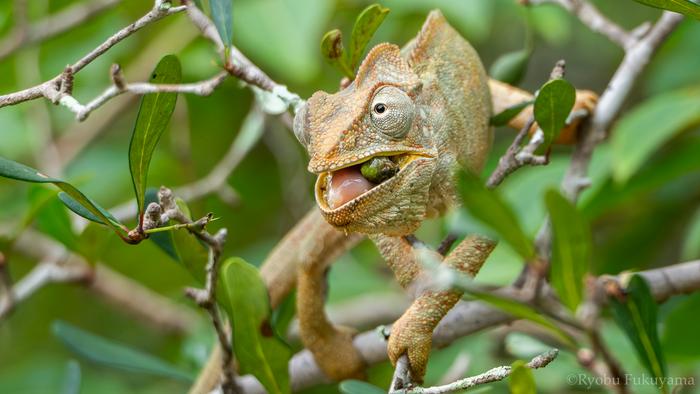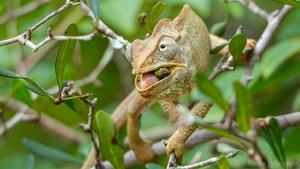
image:
A Malagasy Giant Chameleon (Furcifer oustaleti) eating a fruit from the Madagascar almond tree (Terminalia boivinii)
view more
Credit: (KyotoU / Ryobu Fukuyama)
Kyoto, Japan — After the island of Madagascar drifted away from India 88 million years ago, isolating it from all other landmasses, its flora and fauna evolved in seclusion. As these transformed into plants and animals completely unique to their island, Madagascar became a biodiversity hotspot unlike anywhere else on Earth.
An important facet of this biodiversity is an ecological process called endozoochory, which is when animals eat plant seeds and then poop them out somewhere else, aiding in the spread of the plants. Most research on endozoochory has focused on the roles of birds and mammals as seed dispersers, but lizards, which are also known play a significant role, have remained largely overlooked.
This negligence inspired a team of researchers at Kyoto University to shine a spotlight on the humble lizard. Unlike many seed dispersers, lizards are not typically frugivores, animals that thrive on fruit and other fruit-like plant substances such as nuts and seeds. Fewer than 10% of lizard species have been reported to consume fruits, but those that do can play an important role, and some lizards are even known to act as primary seed dispersers for certain plant species.
“Lizards are under-appreciated as seed dispersers in many forest ecosystems, but we hypothesized that they may play a more important role across a broader range of regions than previously recognized,” says corresponding author Ryobu Fukuyama.
The research team focused on three lizard species in a tropical dry forest in Madagascar, conducting behavioral observations, fecal analyses, and seed germination tests. The species, the Malagasy Giant Chameleon, Cuvier’s Madagascar Swift, and the Western Girdled Lizard, are omnivores known to subsist on fruits, but they had not yet been carefully studied.
The team’s results revealed that the lizards consumed fruits from over 20 plant species and expelled viable seeds. These plant species were largely different from those typically consumed by the Common Brown Lemur, a principal seed disperser in Madagascar’s forests, indicating the lizards may play a more crucial role than previously thought.
Their project isn’t only about acknowledging the importance of lizards, however. In recent years, environmental degradation caused by human activities has taken a toll on Malagasy forests, making some uninhabitable for large frugivores like lemurs. In contrast, the lizard species observed in this study can continue to inhabit these degraded environments. As seed dispersers, these lizards could potentially contribute to forest regeneration, but there are still many unknowns.
“Although lizards in Madagascar consume fruits from many plant species, other aspects of their role as seed dispersers, such as dispersal distances, remain poorly understood,” says Fukuyama. In the future, the team intends to focus further on these additional unknowns.
###
The paper “Frugivory by Three Species of Lizards in Madagascar: Implication for Their Ecological Roles as Seed Dispersers” appeared on 29 May 2025 in Biotropica, with doi: doi.org/10.1111/btp.70052
About Kyoto University
Kyoto University is one of Japan and Asia’s premier research institutions, founded in 1897 and responsible for producing numerous Nobel laureates and winners of other prestigious international prizes. A broad curriculum across the arts and sciences at undergraduate and graduate levels complements several research centers, facilities, and offices around Japan and the world. For more information, please see: http://www.kyoto-u.ac.jp/en
Method of Research
Observational study
Subject of Research
Animals
Article Title
Frugivory by Three Species of Lizards in Madagascar: Implication for Their Ecological Roles as Seed Dispersers
Article Publication Date
29-May-2025
COI Statement
The authors declare no conflicts of interest.
Disclaimer: AAAS and EurekAlert! are not responsible for the accuracy of news releases posted to EurekAlert! by contributing institutions or for the use of any information through the EurekAlert system.


AloJapan.com